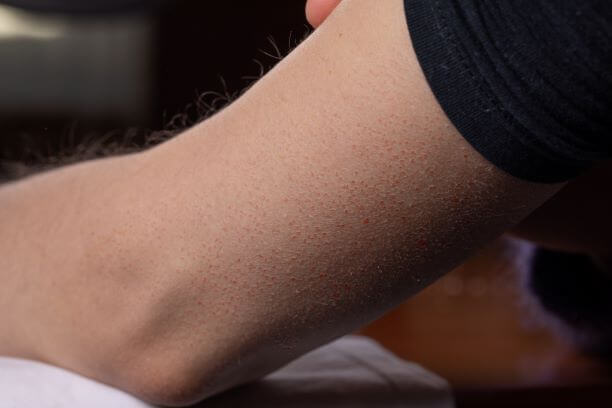If you’re dealing with keratosis pilaris or you have a child who was recently diagnosed with this condition, you may not have heard of this skin health issue before your diagnosis. According to Dr. Miranda Uzoma Ewelukwa of U.S. Dermatology Partners in Sugar Land, Texas, “Keratosis pilaris is one of the most common skin conditions that no one has ever heard of. In fact, most people never even receive a diagnosis. But, this condition is very treatable with the help of a dermatologist. If you’re dealing with keratosis pilaris, a dermatologist can help you manage the symptoms of this condition so that you can look and feel better.” In this blog, Dr. Ewelukwa will walk through what keratosis pilaris is and how you can prevent and treat this common skin condition.
What is Keratosis Pilaris?
Keratosis pilaris is an extremely common skin condition, affecting between 50 and 80% of children and adolescents and 40% of adults. It occurs due to the keratinization of skin cells in and around hair follicles. Keratinization or cornification is the process through which an excessive amount of keratin is produced, filling dead skin cells with keratin proteins that harden the skin. Corns and calluses are common examples of keratinization. In keratosis pilaris, individuals develop small bumps of hardened skin cells around their hair follicles. You may hear this condition described as chicken skin or goosebumps. Most people develop keratosis pilaris on the arms and thighs. In infants and young children, keratosis pilaris bumps may appear on the cheeks and torso. More common in young children and adolescents, keratosis pilaris clears up in many people as they get older.
What are the Common Symptoms of Keratosis Pilaris?
Because keratosis pilaris is benign, many patients receive a diagnosis for this condition as a secondary concern when they visit a dermatologist for a more acute skin condition. To accurately diagnosis keratosis pilaris, your dermatologist will ask you about symptoms, personal and family medical history, and other skin health diagnoses or environmental factors that may contribute to keratosis pilaris. In most cases, a visual inspection and discussion are enough to diagnose keratosis pilaris, but in some situations, a biopsy may be taken. Some of the common symptoms of keratosis pilaris you should be prepared to discuss with your dermatologist include:
- Small, hard bumps on the upper arms, thighs, buttocks, or cheeks
- Patches (scales) of dry skin over the bumps
- Rough skin texture that is similar to sandpaper
- Skin that looks like goosebumps or plucked chicken skin
- Bumps, typically on or near a hair follicle
- Bumps may be red, pale, or slightly lighter or darker than natural skin tone
- In some cases, the skin around the bumps is dry or itchy, but the bumps themselves are not typically itchy or painful
- The condition often worsens in cold, dry climates
What Causes Keratosis Pilaris?
While there is not one individual cause of keratosis pilaris, it is considered to be a genetic skin condition. That means those with a family history of this skin condition are much more likely to develop keratosis pilaris. In addition to genetic predisposition, the development of keratosis pilaris is often related to other dry skin conditions (xerosis, atopic dermatitis, etc.) and certain systemic health concerns (asthma, allergies). Additionally, some individuals develop a seasonal form of keratosis pilaris that flares up during the dry winter months and improves during the more humid summer season. Unlike other common skin conditions that seem to be more prevalent among specific racial groups or impact one gender more often than another, keratosis pilaris impacts all races and genders equally. Keratosis pilaris often develops for the first time in infants, very young children, or adolescents, and while some people seem to outgrow the condition, others never do.
How do I Prevent Keratosis Pilaris?
According to Dr. Ewelukwa, “While many people are concerned with the appearance of keratosis pilaris, the condition is medically harmless and doesn’t require treatment for health reasons. However, people often seek dermatologic treatment to relieve symptoms and improve the skin’s appearance.”
If you or your child struggle with keratosis pilaris, there are steps you can take at home to prevent flareups and address symptoms. Individuals struggling with keratosis pilaris may want to incorporate the following treatments into their regular skin care routines or utilize specific treatments to address flareups:
- Exfoliate regularly – Because keratosis pilaris hardens dead skin cells, regular exfoliation can be an effective way to prevent flareups. Use a mild exfoliant body wash and/or a loofah to gently remove dead skin cells. Avoid harsh, abrasive exfoliants as these can irritate skin and worsen a flareup.
- Use a keratolytic – Often found in lotions and skin care products formulated specifically to address keratosis pilaris, these treatments can breakdown excess skin cell buildup. Keratolytic creams or ointments will usually contain ingredients like alpha hydroxy acid, glycolic acid, lactic acid, salicylic acid, retinoids, or urea. Take caution to use these products as directed to avoid unintentionally damaging or further irritating skin, especially if you also suffer from atopic dermatitis (eczema).
- Moisturize – Dry skin conditions and eczema are commonly associated with keratosis pilaris, so keeping skin moisturized is essential. Because keratosis pilaris often develops in the hair follicle, you may want to choose an oil-free product to avoid clogging pores. Choose a thick, moisturizing cream or ointment, and apply it two to three times each day. Always moisturize immediately after a bath or shower and whenever the skin feels dry.
- Remove hair carefully – Shaving and waxing in areas where keratosis pilaris develops can lead to more severe or prolonged flareups. You should use caution when removing hair and consider alternative epilation treatments like laser hair removal when possible.
- Reduce bath and shower time – Take shorter baths and showers, using cooler water to avoid drying skin.
- Use mild products – Use gentle skincare and cosmetic products to avoid irritating skin and clogging pores.
- Follow dermatologist recommendations – Partner with a dermatologist to create a regular maintenance plan with products that meet your unique skin care needs.
How is Keratosis Pilaris Treated?
In most cases, this benign skin condition does not need to be professionally treated, but if you do want to improve symptoms or the appearance of the skin, there are many treatments available to help manage symptoms, especially if you’re struggling with a severe flareup. If you’ve tried over the counter medications, lotions, and other treatments and they’re not helping, we can offer in-office procedures and prescription-strength lotions and creams to smooth skin, moisturize, and remove dead skin cells. Once your keratosis pilaris symptoms clear up, you’ll need to establish a preventive maintenance plan with your dermatologist to keep symptoms from flaring up again. In severe cases, we may prescribe a corticosteroid to the affected area to soften the keratosis pilaris bumps, diminish redness, and reduce inflammation.
When topical medications and treatments aren’t effective, we may use more advanced laser or light therapies. These treatments can improve skin tone and texture and reduce inflammation. In combination with laser and light therapies, we may also recommend microdermabrasion sessions to remove dead cells and promote the production of healthy skin cells.
According to Dr. Ewelukwa, “Treating keratosis pilaris takes time, so don’t get discouraged if you don’t see an immediate improvement. We may also need to try different combinations of in-office and at-home treatments to ensure you achieve and maintain your desired results. While we can’t cure keratosis pilaris, we can significantly improve the appearance and texture of the skin and minimize the severity of flareups.”
When Should I Visit U.S. Dermatology Partners for Keratosis Pilaris Treatment?
Many symptoms of keratosis pilaris are also common to other skin or whole-body health concerns, so if you’re struggling to control the condition using recommended treatments for keratosis pilaris, you should visit your dermatologist for a diagnosis confirmation. Dermatologists can help you create a personalized skincare routine to control the symptoms of keratosis pilaris. If you’re ready to learn more about treatment for keratosis pilaris or schedule your appointment at U.S. Dermatology Partners, simply complete our request form. A member of our team will be in touch with you shortly to assist you.
Find a location near me
or


